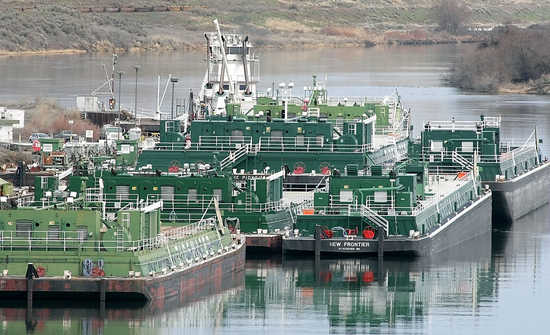forum
library
tutorial
contact

Dredging Work Benefits Mid-Columbia
by Kathy KorengelTri-City Herald, January 31, 2011
|
the film forum library tutorial contact |

|
Dredging Work Benefits Mid-Columbia
by Kathy KorengelTri-City Herald, January 31, 2011 |
 SPOKANE -- After 20 years of planning and work, the first 103 miles of the Columbia River have been deepened three feet to allow ocean-going ships to pass.
SPOKANE -- After 20 years of planning and work, the first 103 miles of the Columbia River have been deepened three feet to allow ocean-going ships to pass.
Although the work took place hundreds of miles away from the Tri-Cities, Mid-Columbia farmers and business owners will benefit, those familiar with the project say.
Area businesses also are expected to benefit from planned improvements to the jetties that safeguard the river's mouth.
About 40 percent of the wheat exported from the United States passes through the mouth of the Columbia River, said Glen Squires, vice president of the Spokane-based Washington Grain Commission.
About 80 percent of the wheat produced in the Pacific Northwest is exported, he added.
"It's huge," Squires said of the channel-deepening project that allows deep-draft ships to fill to capacity.
"We can put more grain on a ship. So it not only lowers the cost per ton for moving the grain out," he said, "it makes the region more competitive because of the lower cost."
Dave Hunt, executive director of the Portland-based Columbia River Channel Coalition, said the channel deepening will allow ships to load an additional 6,000 tons of grain, or 300 additional containers per trip.
The coalition of regional ports, business groups and agriculture associations estimates the channel deepening will save businesses and farmers $18.8 million a year in transportation costs.
About 20 years ago, the Army Corps of Engineers and six Oregon and Washington ports started planning the project to better accommodate ocean-going shipping, which had grown over the years, Hunt said.
The approximately $200 million project deepened the 600-foot-wide shipping channel at the mouth of the Columbia from 40 to 43 feet.
The federal government covered about 65 percent of the project; Washington and Oregon covered the rest of the costs.
The Corps' contractor, Great Lakes Dredge & Dock Co., began dredging the channel in 2005 and just completed the project in November.
Another major fix to the Columbia River mouth is on the horizon, Hunt said.
Frequent and large storms over the past few years have battered the jetties that provide safe passage for ocean-going ships as well as recreational vessels entering the Columbia.
The waves that pilots face at the mouth of Columbia particularly are dangerous, earning it the nickname "The graveyard of the Pacific."
The about 7-mile South Jetty, 2.5-mile North Jetty and one-mile Jetty A provide a safer passage for vessels. The South and North jetties were finished around 1915. Jetty A was completed in 1939.
Because of storms, the ends of the jetties are eroding. Other sections are in danger of breaching, which could push sand into the navigational channel.
"If you don't have working jetties, the whole system falls apart," Hunt said.
Congress funded work and interim repairs were made to the North Jetty in 2005. Interim South Jetty repairs were finished in 2007.
The Corps is evaluating the reliability of the jetties as well as a preferred alternative to provide long-term navigational safety.
About $20 million has been allocated so far for engineering and design work for the project, Hunt said.
Total jetty rehabilitation work is likely to require $400 million to $470 million in federal appropriations over 20 years.
But like the channel deepening project, the jetties are important for the key role they play in maintaining the river as a navigational system, said Port of Pasco Executive Director Jim Toomey.
"The Columbia River is a major transportation system and as a system it's obviously as good as its weakest link," he said.
To the Port of Pasco, the projects at the mouth of the Columbia River "may not be significant. But they are significant to the entire system."
learn more on topics covered in the film
see the video
read the script
learn the songs
discussion forum
